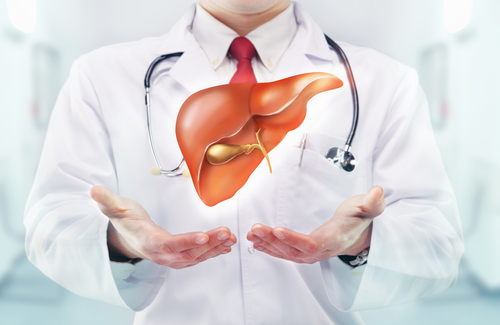Zolgensma-associated Liver Abnormalities Common but Manageable, Study Shows

Most children with spinal muscular atrophy (SMA) show an abnormal increase in the levels of liver enzymes — suggestive of liver damage — following treatment with Zolgensma, according to a study by Novartis, the therapy’s developer.
This known side effect of the gene therapy was mainly very mild and temporary — with less than 1% of patients showing signs of serious liver injury — and completely resolved with the recommended administration of prednisolone.
Notably, pre-existing liver abnormalities and simultaneous use of medication that may potentially cause liver toxicity were common among treated children.
These findings suggest that clinicians should identify potential contributing factors of liver damage in SMA patients given Zolgensma and mitigate risk through appropriate monitoring and treatment, the researchers noted.
The study, “Hepatotoxicity following administration of onasemnogene abeparvovec (AVXS-101) for the treatment of spinal muscular atrophy,” was published in the Journal of Hepatology.
A gene therapy, Zolgensma is one of the three disease-modifying therapies currently approved for SMA. It is available to children up to age 2 with any SMA type in the U.S. and Japan, and for SMA patients in Europe who weigh up to 21 kilograms (about 46 pounds) and have a clinical diagnosis of type 1 SMA or have up to three copies of the SMN2 gene.
Administered directly into the bloodstream, it works by delivering a functional copy of SMN1, the mutated gene in SMA, to cells. The therapy can be given only once, due to the body’s natural immune reaction against the modified virus that is used to deliver the gene to cells.
Still, children can develop immune reactions after the single dose, which may raise the levels of liver enzymes — an indicator of liver damage — and in some cases, lead to serious liver injury.
For that reason, liver function assessments and immunosuppression with prednisolone are recommended before and after Zolgensma dosing.
Now, researchers at Novartis set out to assess Zolgensma’s liver effects in SMA patients to provide information that could potentially help identify, manage, and reduce the risk of therapy-induced liver injury.
They analyzed liver findings, prednisolone use, and simultaneous medications (whenever available) in 325 children with SMA who received Zolgensma until Dec. 31, 2019.
A total of 101 children were given the therapy within clinical trials (two completed and three ongoing), 43 through open-access programs — in which certain patients have access to a therapy before its approval — and 181 after therapy approval.
The most complete data came from patients treated in clinical trials, and all but one were included in the final analysis. Of note, the excluded child had no reports of liver-associated adverse events or elevated liver enzymes.
Results from the 100 children treated with Zolgensma in clinical trials showed that 90% had an increase in the levels of liver enzymes, with most being considered very mild. These levels typically showed a first peak a week after treatment dosing and a second higher peak at one month, after which they started to drop and reached nearly pre-treatment levels by month 2.
Liver-associated adverse events were reported in about one-third (34%) of these children. All events linked to increases in liver enzymes were completely resolved, some with alterations in prednisolone dosing which lasted a mean duration of 83 days (nearly three months) and most commonly ranged from two to four months.
Interestingly, 61% of these children, including those treated before symptom onset, had higher-than-normal levels of liver enzymes before dosing, “which raises the possibility of underlying liver abnormalities,” the researchers wrote.
While the frequency and cause of potential liver dysfunction in SMA patients are unknown, increasing evidence suggests that SMA is a “whole body disease,” affecting not only the nervous system, but also other tissues and organs, including the liver.
In addition, most (96%) patients were receiving at least one additional medication at or after Zolgensma dosing, the most common being paracetamol (more than 40%) — which can potentially cause liver damage.
Liver-related adverse events were also reported in 23% of the children treated through open-access programs, and two (0.5%) showed laboratory findings suggestive of serious liver injury, which was resolved with re-initiation of prednisolone or dosage increase.
Both children were eventually withdrawn from immunosuppressive therapy without reoccurrence of liver damage. Other reported increases in liver enzyme levels were also normalized by the end of the study observation period.
Overall, an increase in liver enzymes was the most frequently reported adverse event among all evaluated children, and none showed signs of being at a risk of fatal liver injury.
These findings highlighted that liver-related adverse events are common among children treated with Zolgensma and that clinicians “should identify contributing factors and mitigate risk through appropriate monitoring and intervention,” the researchers wrote.
Pre-treatment levels of liver enzymes and the presence of underlying liver dysfunction should be assessed, and “potentially [liver-damaging] medications should be avoided if possible, before administration of [Zolgensma] and within 1 month after dosing,” the team added.
Clinicians should follow recommendations on prednisolone treatment and greater doses, and/or longer treatment duration should be considered in children showing post-treatment raises in liver enzyme levels.
“Consultation with a pediatric [GI/liver doctor] should be considered as clinically appropriate,” the researchers wrote.







